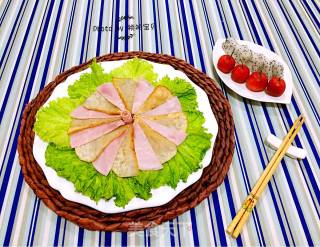Taro in Fresh
1.
I have a piece of Lipu taro at home and I want to change it
2.
First peel the Lipu taro to remove the crusty and impurities
3.
Lipu taro, sliced into thin slices and set aside
4.
Put the cut lipu taro into a container, pour in an appropriate amount of corn oil and powdered sugar, mix well and simmer for about 20 minutes
5.
Each slice of Lipu taro is soaked in sweetness
6.
Pour an appropriate amount of base oil into the pot, heat it, add the simmering Lipu taro slices and fry until golden brown.
7.
Put the fried lipu taro into the container to control the oil
8.
American ham as a second spare
9.
Wash the lettuce and drain the water for later use
10.
The fried Lipu taro and American ham slices are interspersed and placed in the middle of the plate. A small flower is rolled up with American ham slices for decoration.
11.
Lipu taro and American ham are rich in nutrients, suitable for the elderly and children
12.
The delicious combination of the two tastes incredibly fragrant.
13.
All you eat are fragrant, come with a plate of refreshing fruit, dragon fruit, light hawthorn, and relieve greasiness.
14.
When chasing a drama, come to a bottle of Rio small wine, a taste of happiness, where to find?
15.
This delicacy is a must-have delicacy for banquet guests


Tips:
Lipu taro has the effects of invigorating the spleen, promoting dampness, detoxification and reducing itching. It can rationally transport nutrients, moisturize the skin, and improve the body's immunity. Lipu yam, also known as betel yam, is the first choice of tribute in Guangxi at the end of the year for the royal ceremony. Especially in the Qing Dynasty Qianlong period reached its peak. It also formulated special taro for the 2008 Beijing Olympic Games. With the broadcast of the TV series "Prime Minister Liu Luoguo", Lipu Taro has become a household name throughout the country. Lipu taro belongs to the Araceae family, also called Kui taro and betel taro. It was originally a wild taro. It is an excellent variety formed through long-term natural selection and artificial selection of wild taro. It has been artificially cultivated in Lipu County for 400 years. According to records, the Fujianese brought taro into Lipu County. They were first planted in the Guandi Temple area of the county seat and radiated to the surrounding area. Under the special geographical and natural conditions of Lipu County, they were affected by the environmental microclimate. , Has gradually formed a local famous, special and high-quality product that integrates color, fragrance and taste. The quality is far better than the taro produced in other places. The betelnut taro produced in Lipu had the term "Lipu taro" very early in the surrounding counties. During the Kangxi period of the Qing Dynasty, it was listed as the preferred tribute in Guangxi and paid tribute to the imperial court at the end of each year. According to the "Lipu Chronicles" in the 3rd year of the Republic of China, "Old Zhiyun: There are those as large as more than ten kilograms, but there is no one today. However, the ones from the front of Guandi Temple outside the city are better. Cut it out and show the betel nut pattern. Betel nut taro". "The pattern is brown and dense, the powder is loose but not sticky, and the air is fragrant. There are transplanters elsewhere, only the shape of the ears, without the pattern, which is called the palm taro.